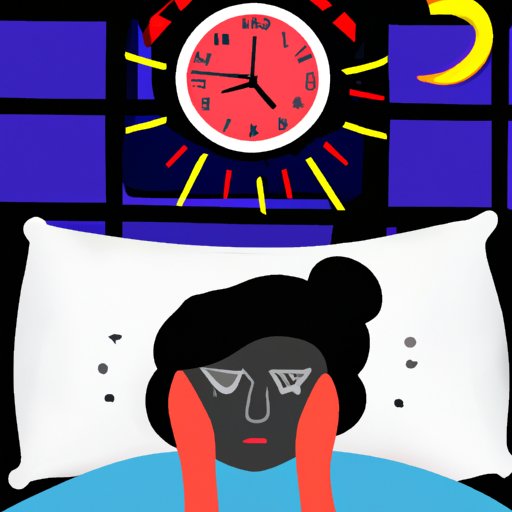Introduction
Sleep is a vital part of our lives, yet many of us don’t get enough of it. According to the Centers for Disease Control and Prevention (CDC), one in three adults in the United States don’t get enough sleep. The effects of sleep deprivation can range from mild to severe, with both physical and mental consequences.
In this article, we’ll explore how sleep affects your health, from its impact on physical health to its role in maintaining cognitive function. We’ll also look at how lack of sleep can affect your immune system, lead to weight gain, and increase your risk of developing certain health conditions.

Examining the Impact of Sleep Deprivation on Physical Health
Lack of sleep can have a serious impact on your physical health. Here are some of the most common effects of sleep deprivation on your body.
Effects on Energy Levels
One of the most obvious effects of sleep deprivation is fatigue. When you don’t get enough sleep, your body doesn’t have time to recharge and restore its energy levels. This can leave you feeling tired and sluggish during the day.
Effects on Immune System
Sleep is essential for a strong immune system. Studies have shown that people who don’t get enough sleep are more likely to get sick than those who do. Lack of sleep can also make it harder for your body to fight off infections and heal itself.
Effects on Weight Loss
It’s no secret that getting enough sleep is important for maintaining a healthy weight. Research has shown that people who don’t get enough sleep tend to eat more calories and gain weight. Poor sleep can also make it harder for your body to burn fat, as well as make it easier for your body to store fat.
Effects on Heart Health
Poor sleep can also have an effect on your heart health. Studies have found that people who don’t get enough sleep have a higher risk of high blood pressure, elevated triglycerides, and a greater risk of stroke.

Exploring the Link Between Sleep and Mental Health
Sleep is also important for your mental health. Here are some of the ways lack of sleep can affect your mood and cognitive ability.
Effects on Mood
When you don’t get enough sleep, it can cause irritability, anxiety, and depression. Studies have also found that lack of sleep can make it harder to regulate emotions, leading to outbursts of anger or sadness.
Effects on Cognitive Function
Sleep is essential for good cognitive functioning. Without enough sleep, it can be hard to concentrate, remember things, and think clearly. Poor sleep can also make it harder to solve problems and make decisions.
Effects on Memory
Sleep is essential for forming memories. Studies have found that people who don’t get enough sleep have difficulty forming new memories and recalling old ones.
How Lack of Sleep Can Affect Your Immune System
Sleep plays an important role in your body’s ability to fight off infections and heal itself. Here are some of the ways lack of sleep can affect your immune system.
Decreased Ability to Fight Off Infections
Your immune system relies on sleep to help it fight off infections. Without enough sleep, your body won’t be able to fight off colds and other illnesses as effectively.
Lowered Immunity to Allergies
Sleep is also important for your body’s ability to fight off allergies. Not getting enough sleep can lower your immunity to allergens, making you more susceptible to their effects.
Reduced Inflammation Response
Sleep also helps your body regulate inflammation, which is important for fighting off infection and healing wounds. Without enough sleep, your body’s ability to respond to inflammation will be reduced.
Investigating the Relationship Between Sleep and Weight Loss
Sleep is an important factor in maintaining a healthy weight. Here are some of the ways lack of sleep can affect your ability to lose weight.
Difficulty Losing Weight
Not getting enough sleep can make it harder to lose weight. Studies have found that people who don’t get enough sleep tend to have slower metabolisms, making it harder for them to burn off calories.
Increased Risk of Weight Gain
Lack of sleep can also increase your risk of gaining weight. Studies have found that poor sleep can lead to increased hunger and cravings for unhealthy foods, which can lead to weight gain.
Appetite Regulation Issues
Poor sleep can also affect your appetite hormones, making it harder for your body to regulate when you’re full or hungry. This can lead to overeating and weight gain.
Analyzing the Effects of Poor Sleep Quality on Heart Health
As well as affecting your weight, lack of sleep can also have an effect on your heart health. Here are some of the ways poor sleep can increase your risk of heart disease.
Higher Risk of High Blood Pressure
Studies have found that people who don’t get enough sleep are more likely to have high blood pressure. High blood pressure can lead to an increased risk of heart attack and stroke.
Increase in Triglycerides
Not getting enough sleep can also lead to an increase in triglycerides, which are a type of fat found in the bloodstream. High levels of triglycerides can increase your risk of heart disease.
Elevated Risk of Stroke
Poor sleep can also increase your risk of stroke. Studies have found that people who don’t get enough sleep have a greater risk of having a stroke than those who do.

Understanding the Correlation Between Sleep and Stress
Sleep and stress are closely related. Here are some of the ways stress can affect your sleep quality and vice versa.
Common Causes of Stress-Related Sleep Problems
Stress can cause insomnia and other sleep disturbances, such as difficulty falling asleep or staying asleep. Stress can also lead to nightmares and night terrors.
Impact of Stress on Sleep Quality
Stress can also affect the quality of your sleep. People who are stressed tend to have lighter and less restful sleep, which can leave them feeling tired and sluggish during the day.
Strategies for Reducing Stress-Related Sleep Problems
There are several strategies for reducing stress-related sleep problems. These include relaxation techniques, such as meditation or yoga, and avoiding caffeine and other stimulants in the evening.

The Role of Sleep in Maintaining Cognitive Function
Sleep is also important for maintaining your cognitive functioning. Here are some of the ways getting enough sleep can help improve your concentration, memory, and creativity.
Improving Concentration
Getting enough sleep can help you focus better during the day. When you’re well-rested, it’s easier to stay on task and pay attention to what you’re doing.
Enhancing Memory
Sleep is essential for forming and consolidating memories. Studies have found that people who don’t get enough sleep have difficulty forming new memories and recalling old ones.
Increasing Creativity
Sleep can also help boost your creative thinking. Studies have found that people who get enough sleep are better able to come up with creative solutions to problems.
Conclusion
Getting enough sleep is essential for your physical and mental health. Lack of sleep can lead to a variety of health issues, from increased risk of heart disease to impaired cognitive functioning. It’s important to make sure you’re getting enough sleep on a regular basis for optimal health and wellbeing.
To recap, here are some of the key points we discussed:
- Sleep is important for your physical health, from your energy levels to your immune system to your heart health.
- Sleep is also important for your mental health, from regulating your mood to improving your memory and cognitive functioning.
- Lack of sleep can also have an effect on your weight and your ability to fight off infections.
- Stress can also affect your sleep quality, so it’s important to find ways to reduce stress in order to get good quality sleep.
Getting enough sleep is essential for your overall health and wellbeing. By making sure you’re getting enough sleep each night, you can improve your physical and mental health, as well as your quality of life.
(Note: Is this article not meeting your expectations? Do you have knowledge or insights to share? Unlock new opportunities and expand your reach by joining our authors team. Click Registration to join us and share your expertise with our readers.)
